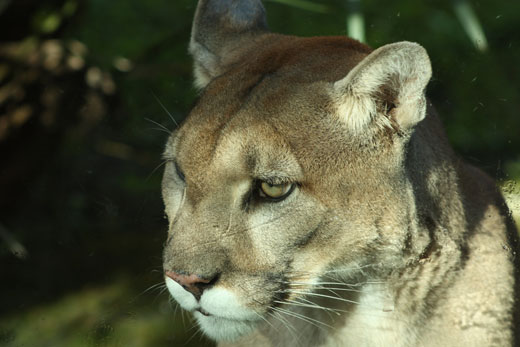A founder of conservation genetics, Dr Stephen O'Brien, will be speaking at Tauranga Café Scientifique on April 29, discussing wildlife genetics.
Stephen will explain to his audience how powerful new genetic technologies have revolutionised our ability to understand the natural history of threatened mammals, and recognise hidden genetic vulnerabilities.
Dr Stephen O'Brien's Tauranga talk will include the genomic footprints of tigers, cheetahs and the Florida panther (pictured). Photo: Thinkstock.
A field that began just 30 years ago, conservation genetics is now an important factor in every management decision regarding saving wildlife.
Dr O'Brien is Chief Scientific Officer at St Petersburg State University in Russia and author of science adventure stories ‘Tears of the Cheetah and other Tales from the Genetic Frontier'.
He uses the tools of molecular biology to help protect endangered species and understand devastating diseases such as cancer and AIDS.
His talk will show what life histories are revealed in the genomic footprints of tigers, cheetahs and the Florida panther.
The case of the latter prompted 'bold genetic action”. In the 1990s there were fewer than 30 Florida Panthers left. The demographic and genetic computer models were quite clear – if nothing was done there was a 95 per cent chance the species would become extinct within 25 years.
'That was the headline that finally turned the heads of even the most vociferous objectors to invasive action,” says Stephen.
'We supplemented the population with a handful of ‘first cousins' from across the Mississippi, called Texas cougars – but not until after a long political exchange where objectors and self-proclaimed experts were arguing that we should just leave them alone.
'Genetics is particularly useful for identifying the numerous hidden dangers that further threaten endangered mammals.
'These include historic events such as inbreeding or infectious disease, such as Ebola, which affects chimpanzees, and canine distemper, which decimated the wild dog in East Africa.”
Dr O'Brien believes that New Zealand is a world leader in conservation, and is doing a good job in controlling invasive species.
'I am delighted to be visiting the home country of Allan Wilson, who was a friend of mine,” he reveals. 'I learned so much from him. He changed the world – the whole field of molecular evolution stands on his shoulders.”
The late Allan Charles Wilson was a Professor of Biochemistry at the University of California, Berkeley, and a pioneer in the use of molecular approaches to understanding evolutionary change and reconstructing phylogenies, and a revolutionary contributor to the study of human evolution.
Café Scientifique seats for the event on Wednesday, April 29 can be reserved at: www.allanwilsoncentre.ac.nz. Doors are open from 6.00pm for a 6.30pm start at the Tauranga Yacht and Power Boat Club, 90 Keith Allen Drive, Sulphur Point, Tauranga.
Entry is by gold coin donation. For more information contact Wendy Newport-Smith, Manager of the Allan Wilson Centre, at; w.newport-smith@massey.ac.nz or call: 021 423 757.



2 comments
Cougars
Posted on 21-04-2015 13:34 | By BullShtAlert
I'm quite interested in the behaviours of the Texas cougars referred to in the story. Will cougars form part of this evening and talk?
Cougars abound....
Posted on 22-04-2015 05:42 | By Jimmy Ehu
who cares where they are from, if there are going to be "cougars" there I am in!!!!.
Leave a Comment
You must be logged in to make a comment.